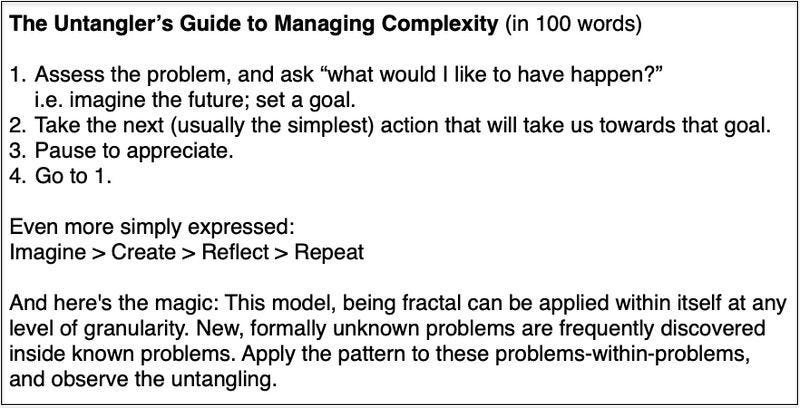I find I don’t write here very often, but I do occasionally write—mostly short posts, designed to provoke thoughtful responses from those in my LinkedIn community. This is a selection of posts from the last two months, in case you missed, or in case you’d like to reread a few. I invite you to comment here, or on join the conversation on the original post by clicking its link. I present the five posts here in chronological order.
—
Life Coaching
Just wondering aloud here…has life & work become so much more complex today than it was 20, 30, 40 years ago? So much so that people working in the corporate world these days now have/need a "life coach"? As an uncoached sixty-something I am starting to wonder how people (like me) got by without coaching. Was it just that we trusted our colleagues more, had more open, honest conversations with friends and others in our communities, or was pastoral care more available and more meaningful...or was it that we just cared less. It's strange isn't it? So many coaches, all needing coaching clients. Is it an industry that created itself, or is there really a need for it? What has caused that need? [original post]
—
Managing Complexity
Humans have existed and worked within a complex world since we first evolved. Therefore, the kind of problems we encounter as we navigate through this world, taming the earth (for better or worse) and creating civilisations must be complex problems. Until the invention of the corporate world, and the business consultant we just got on with life, overcome such problems and created wondrous things. Nowadays, we must study various 'complexity models', read several books, attend workshops and retreats, argue on LinkedIn, become certified in various ways, or even achieve an MBA qualification to begin to tackle even the simplest of the current-day complex problems. But it needn't be that way.
I have written the definitive guide to managing complexity. Here it is, in its entirety. And by the way, the words "in 100 words" count as three of the 100 words of this guide. If I took them away it would be a 97-word guide, altogether less satisfying, I'm sure you'd agree. [original post]
—
The Immutability of Scrum
The Scrum Guide is the source of truth for Scrum; it is the rules of the game. Any organisation wishing to, or claiming to implement Scrum must agree to the rules of Scrum, and every scrum team must follow the rules—all the rules. The Scrum Guide is very clear on this:
"The Scrum framework, as outlined herein, is immutable. While implementing only parts of Scrum is possible, the result is not Scrum."
This clear, unbending request leads many to claim, often quite indignantly, that Scrum cannot be Agile. This intended put-down, or dismissal of Scrum is no put-down at all; it is quite accurate. The Scrum framework as described in the guide is distinctly not agile. It is quite the opposite: unbending, inflexible, immutable. Scrum is a structure, that, when implemented in full, will create the conditions for agility to occur—specifically for agile software development to occur. A flexible, vague, ever-changing structure could never do this. It would instead create confusion and chaos. A cup designed for holding liquids cannot itself be liquid.
We seem to forget that the vast majority of our IT organisations already have 'agile' operating structures, with vague, opaque rules that change on a whim, creating confusion, disengagement and demotivation. We don't need more of this. Instead we need a small, simple set of unchanging rules, empirically proven to create the conditions for innovative, elegant software solutions and warm, engaged relationships in the workplace. This is what Scrum offers us, if we learn how to read the Scrum Guide with open eyes, an open mind, and an open heart. [original post]
—
On Making Scrum Masters
It is often said that a two-day class will not (indeed cannot) turn you into a scrum master. A close colleague of mine, who teaches CSM also said this recently. Yet I find I disagree. Going back 20 years I remember that I was turned into a scrum master on a two-day class with Ken Schwaber & Kert Peterson, I absolutely was. I wasn't a very good scrum master at first, for sure, but I certainly embodied the role, and I continued to improve.
Being a scrum master is not an end point, it is a beginning. The CSM is a doorway to a new way of being. Good scrum masters inspire others to see the world of work differently. I like to believe (and have some reason to) that over the past 20 years a few people I've taught also became scrum masters in a two-day class—and have in turn inspired others to manifest their inner scrum master. Maybe you :) [original post]
—
Reconceiving CSM
"The best architectures, requirements, and designs emerge from self-organizing teams." The Manifesto for Agile Software Development
I had the pleasure of pairing with Khurram Bhatti this weekend to teach an online CSM. It's rare to find such flexibility, creativity and a willingness to improvise in a Scrum trainer these days. We each have very different CSM designs, but rather than either of us leading (as originally planned) we just let go of our own designs and allowed a new design to emerge. Having many people from non-IT backgrounds in the group also helped. The participant contributions came through unexpected—sometimes tangential—questions, and off-beat interpretations, which allowed new exercises to be born, like this one: Scrum in Your World, which illustrates six wildly different applications of Scrum in non-IT contexts, showing just how natural this way of working really is.
With two very different CSM designs, we could have resorted to a sort of compromise, some of this, some of that, each picking our best bits and cobbling them together into a sort of chimera. But compromise is a negative force, descending as it does to the lowest common denominator, and losing the big picture. Instead what we allowed through letting go of our own ideas (especially the good ones) was a reconceiving, a rising above what already exists to create something new, something inspired by its makers and contributors alike, something suited to purpose. And something we'll never repeat. All CSMs are different, but this one was more different than others, a river nobody will step in again. I left energised and overflowing with gratitude, for my co-teacher, for our students, and for a life where I get to experience a joyous awakening of hearts and minds and engage with some brilliant people, time and time again. [original post]
—
I hope you enjoyed these thoughts. Please add a few of your own in the comments.





